Staff Inquiry: Our Favorite Feel-Good Films – What’s Yours?

I love film, more than people probably, and I will…
The holidays are over and it’s back to work and school. It’s a long wait till Halloween and an even longer one till Christmas. Even us writers at Film Inquiry pace around anxiously, watching out for the beginnings of Oscar season. So this month we’ve decided to relax, step back and think about the films that buoy us up in low times. These may be films which provide us with solace when we’re feeling low, a burst of energy when life gets slow, or ones that simply make us smile. So without further ado here are our favourite feel-good films.
Alex Lines: Hot Tub Time Machine
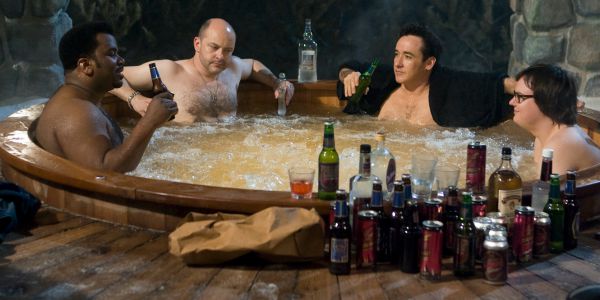
Whilst it’s easy to pick a comedy for a film that makes you happy, Hot Tub Time Machine manages to combine 80’s comedic goofiness with some genuine heart as well. It’s a film that is aware of its crazy premise and really capitalizes on it in a way that is fun, featuring an eclectic cast of characters who share genuine chemistry and really seem like an actual group of friends. The reason it’s my feel good film is because it’s highly rewatchable, a film which creates a nice juxtaposition between the 2000’s comedic style of pop culture heavy, sexually suggestive dialogue mixed with the 80’s broad slapstick style of comedy, and creating something entertaining between the clash.
Underneath the constant banter between its leads, John Cusack, Rob Corddry, Craig Robinson and Clarke Duke, there’s a constant undercurrent of subplots and running jokes which all feature some form of payoff. And these all work, really helping give the film a sense of ongoing energy which makes sure it never slows down whilst never sacrificing its themes or heart for the sake of cheap comedy. The themes of nostalgia, friendship and the challenges of adulthood are juggled well and are actually taken seriously by the film and the filmmakers, which makes them actually feel genuine, rather than tacked on and seeming disingenuous. Oh and any film which features David Bowie’s “Modern Love” is bound to put a smile on my face.
Alex Windley: Seven Brides For Seven Brothers
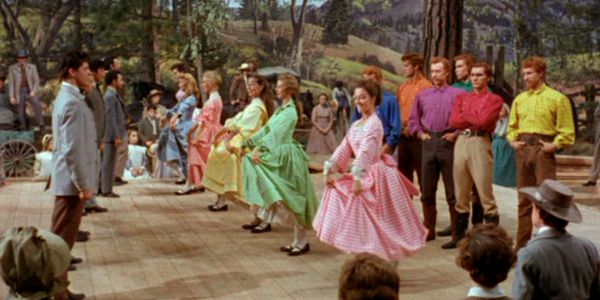
Seven Brides For Seven Brothers is a musical from the legendary director Stanley Donen. Howard Keel plays Adam Pontipee, a backwoods man who lives with his six brothers in 1850’s Oregon. Adam needs a wife; so, one day he goes into town to find himself a woman naive enough to marry him from such a stupidly short courtship.
Milly, played by Jane Powell, is excited about the prospect of no longer being single (something everyone can relate to). For the rest of the movie we witness the struggle Milly goes through trying to adjust to her new found life, and along the way she teaches not only Adam but also his brothers a few things about being gentlemen.
If you know your film history, the filmography of Donen may sound familiar. Singin’ in The Rain, Funny Face, Indiscreet, and On The Town are all cinematic classics (and most of them are sitting in my cabinet right now). So, it would come to no surprise that I am also a fan of this underrated gem.
I absolutely adore this film. I would recommend it for anyone in the mood for a good ole’ dream factory musical. This movie is quintessential classic Hollywood; it puts you, as the viewer, in such a jovial mood. Between the bright colors, catchy songs, massive soundstages, and amazing dance scenes, I genuinely challenge you to find a more enjoyable movie than this. I truly believe it is one of the more enjoyable films I’ve seen in my lifetime.
Alistair Ryder: Groundhog Day
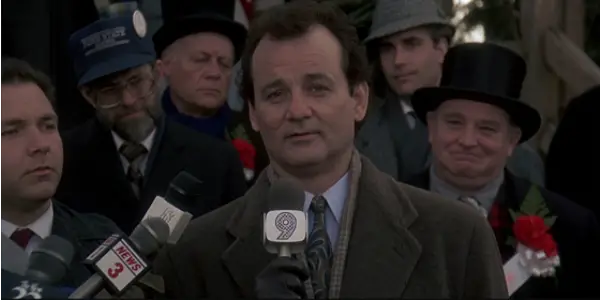
It wasn’t until putting pen to paper (or in this case, fingers to keyboard) that I realised just how much I enjoyed films with a cynical disposition. It turns out that the majority of my favourite films are either nihilistic, blackly comic or imbued with an underlying sense of melancholy that makes them emotionally overwhelming. Groundhog Day is a rare exception to the rule. Firstly, the casting of Bill Murray, the most loveable cynic in cinema history, ensures the film has a dry, biting humour amidst all the underlying sweetness.
The film is a love letter to the small town Americana portrayed in the films of Frank Capra, but with Murray in the lead, it feels somewhat subversive. It manages the near impossible tightrope walk of being sweet and cynical; this is a film with numerous suicide attempts and multiple violent outbursts at poor Ned Ryerson (Stephen Tobolowosky), yet still embraces the wonder of being alive in a way that doesn’t feel sentimental or at odds with anything that has come before.
It is a feel good movie for people who love feeling bad at the movies and without a doubt the best American comedy of the last quarter century. Like Phil Connors stuck in the time loop, Groundhog Day still hasn’t aged and feels as fresh and as funny as when I first saw it.
Arlin Golden: The Jerk

The Jerk is one of those films that I can sit down and watch from any point and enjoy. The film is a last gasp from the zany, madcap comedies of old Hollywood (a form that would see its final embodiment a few years later in Pee-Wee’s Big Adventure, another film that could easily justify my spot on this list), before spoof and cynicism hijacked the genre. We follow Navin from poverty through the ranks of society and back again, at each point getting a glimmer of the absurdity of everyone’s station in life, rich or poor.
The plot is really secondary (or maybe even trimary? is that a word?) consisting of a loosely connected series of events that bring Steve Martin’s Navin Johnson from one set piece of life to the next. Martin’s performance carries the film along, as Navin’s sincerity and genuineness really shine through and allow the viewer the perfect perspective against which to compare the cruelty and cynicism of the rest of the world. It’s a world that doesn’t seem to be made for such a pure soul, and I think that feeling really exemplifies the common life experience; that a few key choices and actions are of our own making, but for the most part we are strung along through life by circumstances and forces beyond our control.
It’s Navin’s ability to stay true to himself and discover whats really important in life, in the face of life itself, that makes The Jerk such a joy to me. I haven’t even talked about the one-liners or the sight-gags, the amazing supporting cast or even “Tonight You Belong to Me”, but suffice to say The Jerk is hilarious, life-affirming and is always there to pick you up when you are down.
David Fontana: The Princess Bride
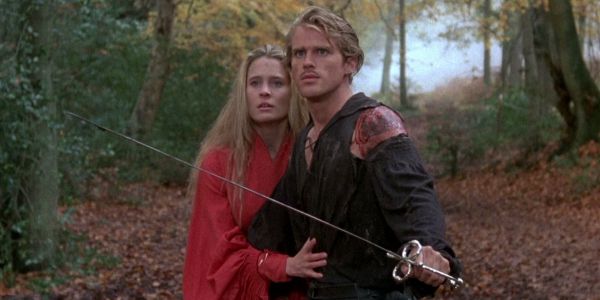
Since the first time I saw Rob Reiner’s The Princess Bride, it has always been my go-to movie for when I just want to feel happy. There is just something so magical about it – from the outline of the film itself, being a story-within-a-story, to the memorable characters, to the still very quotable dialogue. It’s truly one of a kind.
The first aspect of the film that makes it unique is the way it is structured. It may start off with all of the usual fairy tale clichés, which consist of a woman named Buttercup (Robin Wright) falling in love with a poor farm boy named Westley (Cary Elwes); but there are soon a few clues that it is much cheekier than you would expect. The first clue is that the story of the film itself is being read to a boy (Fred Savage) by his grandpa (Columbo’s Peter Falk), a tongue-in-cheek aspect that sometimes breaks up the story at the most (or least) ideal moments. Then, we meet the so-called villains of the film: Fezzik (Andre the Giant) and Inigo Montoya (Mandy Patinkin). Their initial altercations with a mysterious man in black are among my favorite scenes of any movie, especially the energetic swordfight between the masked man and Inigo, which is full of hilarious quips, impressive swordplay, and some truly inspired moments.
Some other highlights: Westley and Buttercup attempting to make it through the fire swamp, Fezzik and Inigo reviving a “mostly-dead” Westley by bringing him to Miracle Max (played by an almost unrecognizable Billy Crystal), and Inigo’s climactic battle with his sworn enemy, the “six-fingered man” Count Tyrone Rugen (Christopher Guest), in which Inigo shouts repeatedly: “My name is Inigo Montoya! You killed my father! Prepare to die!” Ah Mandy Patinkin you were never so wonderful.
There is just so much to love and admire about The Princess Bride, whether it’s the comedic aspects, the medieval fantasy setting, the story-within-a-story, or even the romance itself, which is somehow more believable than 90% of rom-coms out there. It’s the type of film where everything just seemed to come together in the perfect manner, leaving me so peacefully satisfied. And for that reason it has, and likely always will be, my ideal feel-good movie.
Jay Ledbetter: Wall-E
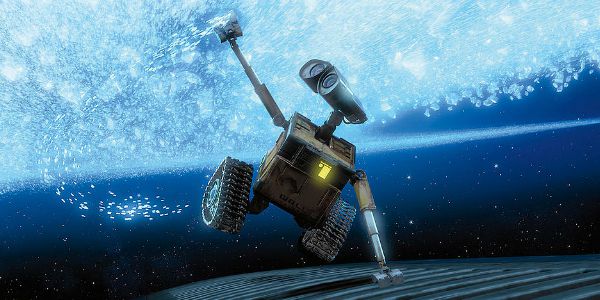
No character emits sheer happiness quite like WALL-E. With him, Pixar was able to turn a mobile trash compactor into an adorable adventurer. WALL-E is a dreamer and an eternal optimist, something we all wish we could say of ourselves. You want nothing but the best for him, and his quest for love is beautiful, rewarding, and surprisingly human. No matter how terribly my day went, watching WALL-E and EVE soar through space as just-met lovers will pick me up and instill in me the same sort of optimism WALL-E possesses. If a little robot whose sole purpose was supposed to be stacking cubes of trash miles high can find joy in the mundane parts of what used to be human life on Earth, why can’t I do the same?
Beyond the beautiful love story, WALL-E also gives a sense of hope for the whole of humanity. It is WALL-E that reminds the former inhabitants of Earth (just as he does to me) that maintaining the planet and valuing human interaction is essential to a life worth living. We are not beyond saving. Even when all seems to be spiralling out of control, there is hope. Human nature is not one of destruction, but of unity. We want to help one another, whether we realize it or not. It’s nice to have a squatty little robot remind me of that every now and then.
Julia Smith: Singin’ In The Rain
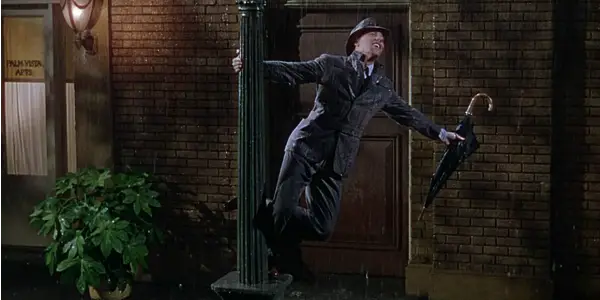
From an early age I’ve treated films as some kind of therapy. And while I have a list of ‘feel-good’ films a mile long it’ll always be Singin’ In The Rain that sticks out for me. I saw the film after one of my favourite university lecturers encouraged me to turn up for a 9am showing of the film, hangover and all. And I absolutely fell in love with it.
Singin’ In The Rain, on the surface of it, is a bright and energetic musical. But more than that, it is about something I love most; filmmaking. I take great joy in the optimism and creativity of the characters, and also the fun they seem to glean from a seemingly doomed situation.
The film is set in the 1920’s, talkies are being introduced and the future of silent movie star, Don Lockwood (Gene Kelly), looks uncertain. But after falling for the serious Kathy Selden (Debbie Reynolds) Lockwood is determined to prove himself. So, with best friend Cosmo (Donald O’Connor) and Kathy in tow he turns his doomed movie, The Duelling Cavalier, into a musical. The story is fantastic and the humour is perfectly timed; but its the musical numbers so finely tuned by Gene Kelly that really make this film sparkle.
My love of this film, though, is probably most keenly felt above all others because of its place in my memory. The film was to enter my life before a number of unhappy events occurred, and its positive effect is indelibly marked on me. It’s my reminder of the joy I take in film, the important lessons I learnt from my teachers, and the lesson I ultimately learnt from the film itself: to not let the rain get you down.
Manon de Reeper: Spirited Away
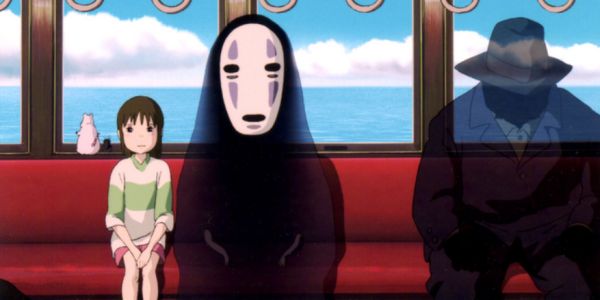
I don’t exactly remember the first time I saw Spirited Away, but it’s made a lasting impression on me, and I keep returning to it. To me, the magical realism of Spirited Away is like a soft embrace, where just for a moment you’re whisked away from the real world, sucked into its stunning colours and animation, the fascinating characters (be it from the giant baby/tiny hamster to greedy no-face or confused Haku/awe-inspiring dragon spirit), and the deeply touching music.
Whenever I feel particularly sad, or in need of a moment of consolation or comfort, I watch this movie – and even though it doesn’t always exactly cheer me up, it always makes me feel better. Its story is very reaffirming: it deals explicitly with what it’s like to grow up – and that it’s okay to falter sometimes. Through Chihiro’s adventure, legendary director Miyazaki tells us, comfortingly, that while major life changes can be scary, you can overcome those fears, and survive the change. Furthermore, it points out the blurred line between good and evil: there is no true evil in the world, instead, it’s a big blur of shades of gray – to me, this is what makes this movie so much more valuable than any Disney movie.
Lastly, the movie tells you to appreciate anyone and everyone for who they are no matter their shortcomings. It’s a tale of forgiveness and acceptance, and what is more beautiful than that?
So, was your favourite feel-good film amongst our bunch? Why not share your own in the comments?
(top image – Groundhog Day (1993) – source: Columbia Pictures)
Does content like this matter to you?
Become a Member and support film journalism. Unlock access to all of Film Inquiry`s great articles. Join a community of like-minded readers who are passionate about cinema - get access to our private members Network, give back to independent filmmakers, and more.
I love film, more than people probably, and I will watch pretty much anything. Seriously, anything! I have a postgraduate education in film & have spent an exceptionally long time trying to get inside the film industry. I'm a big believer in treating every film the same, and bringing something new to the film theory table, giving reasons for every argument made. You'll find that I'm an empathetic and fun sort of reviewer, at least, I like to think so. If I'm not watching films I'm doing exceptionally nerdy stuff, like watching documentaries about the history of medicine and collecting photos of old post boxes.













